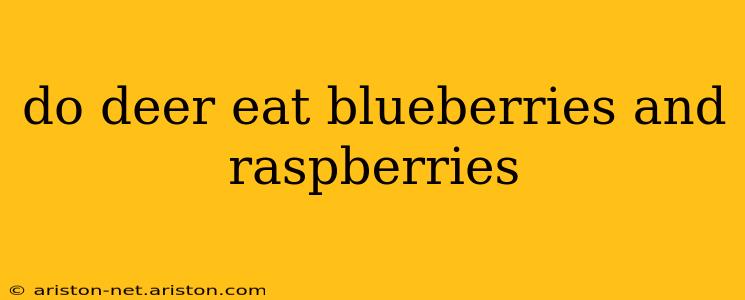Deer are herbivores with a surprisingly diverse diet, adapting to various food sources depending on their location and the season. So, do they eat blueberries and raspberries? The short answer is yes, but let's explore this in more detail.
Deer are opportunistic feeders, meaning they'll consume a wide range of plants, including fruits, leaves, twigs, and buds. Blueberries and raspberries, being sweet and nutritious, are definitely on their menu. However, the extent to which they consume these berries depends on several factors.
What Other Foods Do Deer Eat?
Deer are known for their adaptability and will consume a wide variety of plants and vegetation. Their diet is largely dictated by what is seasonally available. This often includes:
- Forbs: These are flowering herbaceous plants, including clover, dandelion, and various wildflowers.
- Grasses: Deer consume various types of grasses, particularly in open fields and meadows.
- Trees and Shrubs: Deer browse on leaves, twigs, and buds from various trees and shrubs, such as oak, maple, and aspen.
- Agricultural Crops: Unfortunately, deer can also be significant pests in agricultural areas, consuming crops like corn, soybeans, and alfalfa.
- Fruits: In addition to blueberries and raspberries, deer will also consume other fruits when available, including apples, cherries, and pears.
Are Blueberries and Raspberries a Favorite Food Source for Deer?
While deer will certainly eat blueberries and raspberries, it's not necessarily their favorite food source. Their dietary preferences depend on factors such as:
- Availability: If other preferred food sources are scarce, deer will readily consume blueberries and raspberries.
- Nutritional Value: Blueberries and raspberries offer valuable nutrients, making them a desirable addition to their diet.
- Competition: The presence of other animals competing for the same food sources can influence a deer's consumption of berries.
How Much Do Deer Eat?
The quantity of food a deer consumes varies significantly based on factors such as its size, age, sex, and the season. During the winter months, when food is less abundant, deer will eat less than they would during the summer. A single deer might consume several pounds of vegetation daily.
How Can I Protect My Blueberries and Raspberries From Deer?
If you're growing blueberries or raspberries and want to protect them from deer, several strategies can be employed:
- Fencing: A strong fence is the most effective deterrent, keeping deer out of your garden.
- Repellents: Commercial deer repellents are available and can be sprayed on plants to deter browsing. However, these often require reapplication, especially after rain.
- Netting: Covering individual plants with netting can protect them from deer, but this can be labor-intensive, especially for larger plants.
What plants are poisonous to deer?
While deer are quite adaptable, some plants are toxic to them and should be avoided. Examples include:
- Azaleas and Rhododendrons: These contain toxins that can be fatal to deer.
- Oleander: This highly toxic plant should never be consumed by deer or any other animal.
- Yew: Parts of the yew tree are extremely poisonous.
Understanding deer diets helps us better appreciate their ecological role and develop strategies for managing their interactions with humans, particularly in areas where agriculture and wildlife coexist. Remember, responsible land management practices are essential for ensuring the health and well-being of both deer populations and the plants they consume.
